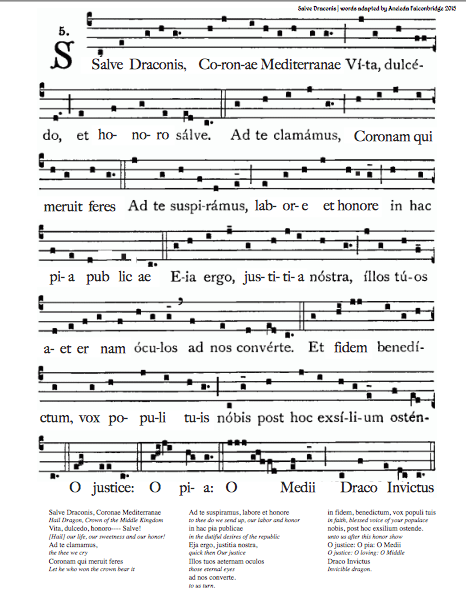This performance was recorded at the East Kingdom Bardic Championship in February 2023 as my final round offering, as His Majesty had requested that I include an instrument in my performance, and that maybe a love song would be good if I had one.
The story our poet tells is one of great and enduring love. He speaks of faithfulness, loyalty, and perseverance–among the best of the chivalric virtues.
I’d long wanted to perform this piece, which I translated to Middle English many years ago. It was only very recently, however, that I discovered how I would finally set it to harp. This recording is its debut performance. Probably it’s worth mentioning that I realized the setting roughly 36 hours prior to the performance and didn’t plan on performing it it, really, but the request from His Majesty made it clear that this piece was the only possible choice.
I don’t know how I managed to keep a straight face. There were only a couple of people who knew of this song’s existence, and when I started the introduction, my boon companion, who was standing in the back of the hall, suddenly made an elated football touchdown motion that threatened to undo my composure. (My expression at 00:22 is when I made eye contact with said companion for the first and only time during the performance, for self-preservation.)
Those who were in the know started quietly snickering early at the first chorus. Those who understood Middle English started to get it as it went along. That began the giggling and a little whispering. When the ever-composed Mistress Ana deGuzman, a poetess and performer who I greatly admire, suddenly put her head down on the table and transformed to a pile of shaking veil, it was all I could do to not leap up and make a touchdown gesture in delight. That alone was worth the whole adventure.
Ultimately, this closed out a great day. I dusted off my prowess, had well-received performances, and Rickrolled the East Kingdom during the finals.
The Lay of Richard Rollings of Astley
(as told in Middle English by Aneleda Falconbridge)
Forswear thy pledge, myn weneth
nat everich oon yeven thilke
I but mine thoughts unbinden
ant thou understandan mak.
Neuer ic the ne yeve away
Neuer ic the nolde na doun
Neuer ic sette forth and forsake thee
Neuer ic yelde wepen mak
Neuer ic farewell spake
Neuer ic thee disceyve and peyne
We ken our leman mony a day
achen thou hart, thou fain would ne hit spake
we ken wot is now befalle
we wyste the sport and we wolde it play
Ant shoud thou ask mine heart,
are thee ne blind to ken?
Neuer ic the ne yeve away
Neuer ic the nolde na doun
Neuer ic sette forth and forsake thee
Neuer ic yelde wepen mak
Neuer ic farewell spake
Neuer ic thee disceyve and peyne
Neuer ic the ne yeve thou.
Lyric and arrangements © 2013 & 2023 Monique Bouchard (known in the #SCA as Aneleda Falconbridge) inspired by the immortal poet Richard of Astley. 😉
This post was called “A work in progress” back in Sept. 2013, when I first thought it would be funny to do. I was trying to set it to a number of historic works, none of which were a good fit. This is the first draft.
Forswear thy pledge, myn weneth
nat everich oon yeven thilke
I but mine thoughts unbinden
ant thou understandan mak.
Neuer ne thou yeveth forth
Neuer thou nolde na doun drede
Neuer ne sette forth awa y thou forsake
Neuer ne thou yeven soregh mak
Neuer ne spake adeiu
Neuer ne thou disceyve y pyne thee
We ken our leman mony a day
achen thou hart, thou fain would ne hit spake
we ken wot is now befalle
we wyste the sport and we wolde it play
Ant shoud thou ask mine heart,
are thee ne blind to ken?
Neuer ne thou yeveth forth
Neuer thou nolde na doun drede
Neuer ne sette forth awa y thou forsake
Neuer ne thou yeven soregh mak
Neuer ne spake adeiu
Neuer ne thou disceyve y pyne thee
Neuer ne yeveth forth
Ne yeveth forth.
Extra bonus points from Aneleda if you can figure out the inspiration for this piece. 😉


